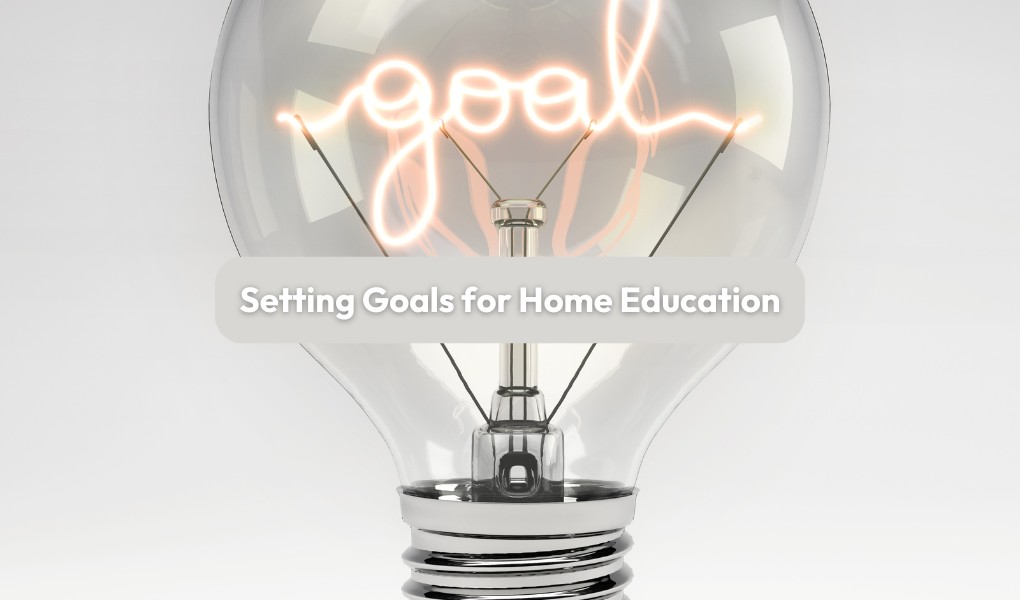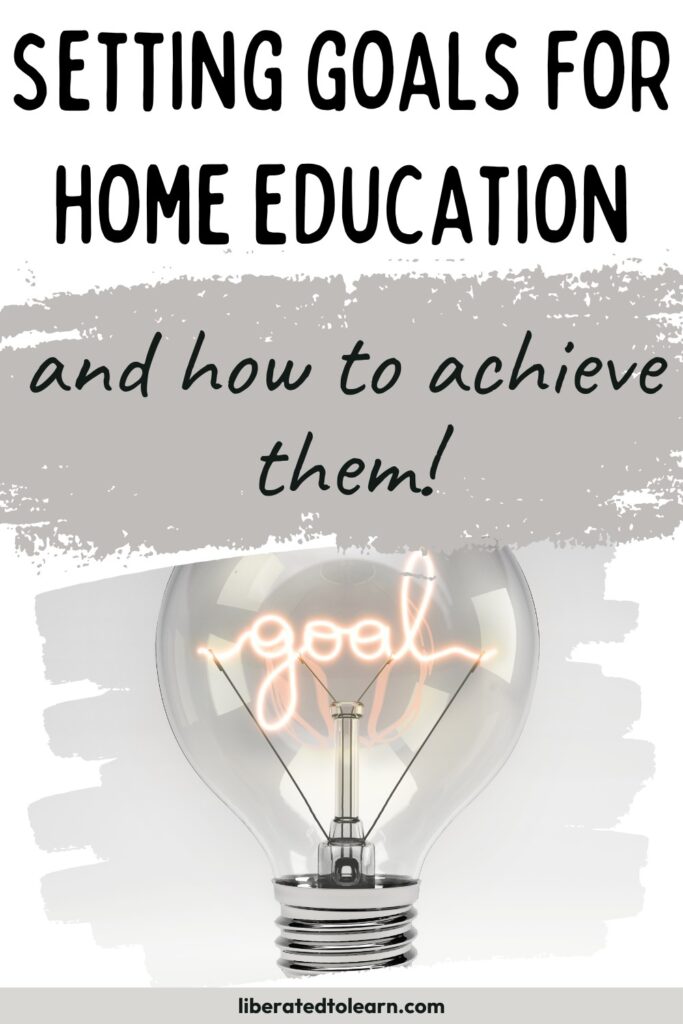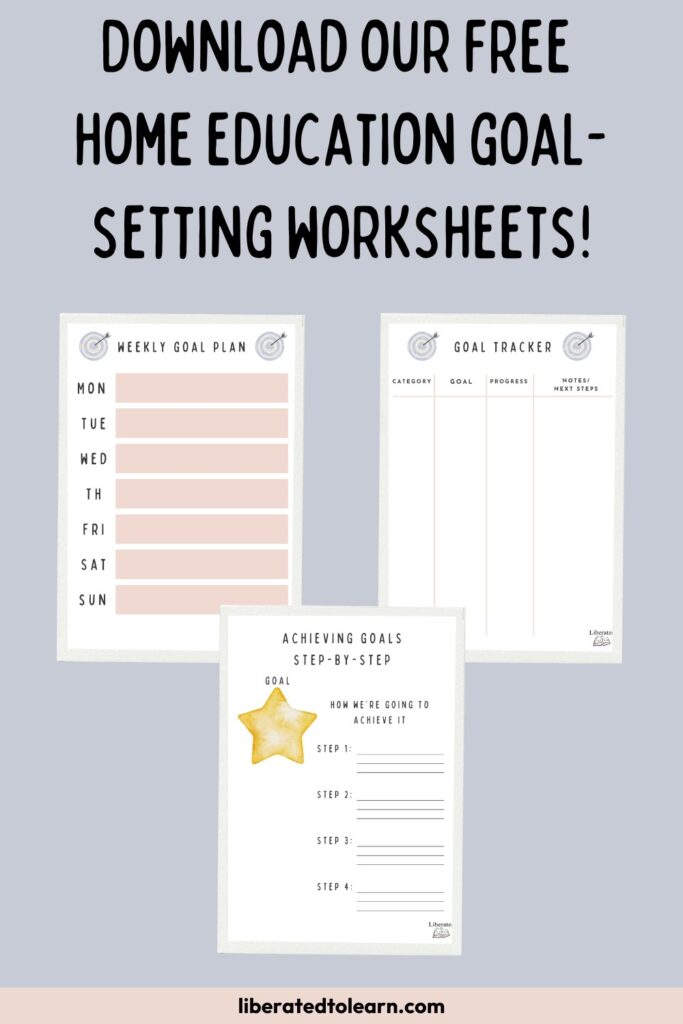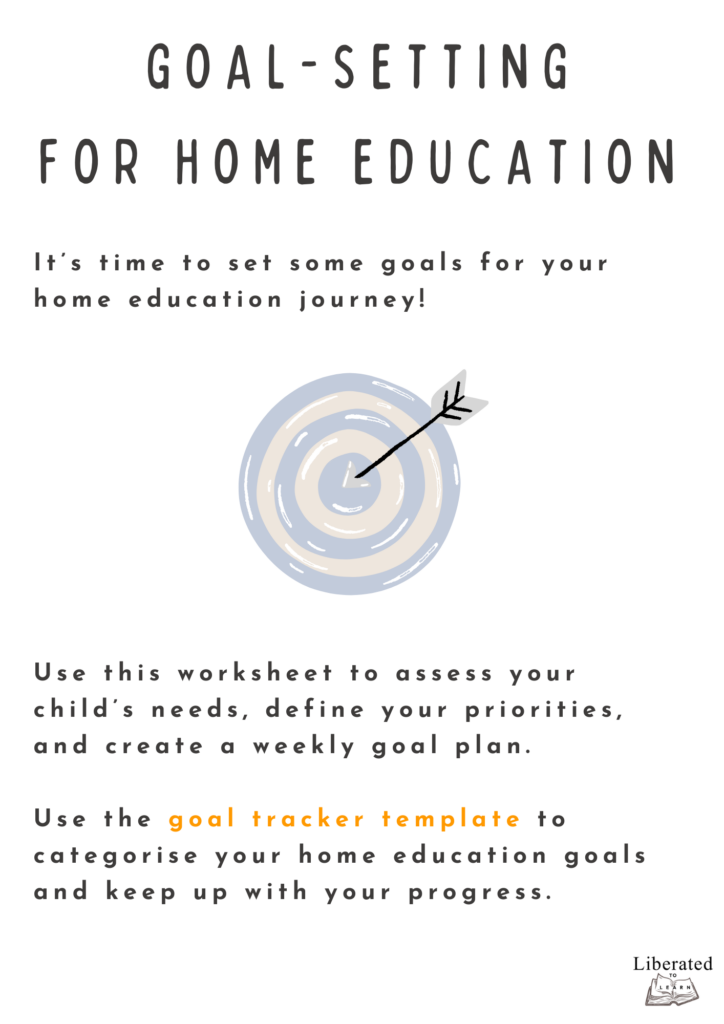If you’re struggling to set goals for home education, fear not! We’re about to give you some goal inspiration and tips to help you achieve your home education goals!

If you’re home educating, it’s likely that you’ll want to set some goals, whether they be educational or personal. But what if you don’t know where to start?
Sometimes it’s the goals themselves that can be hard to pinpoint at first, rather than the journey of trying to achieve them (that’s the fun part!). Without goals, you might feel lost. It’s like trying to follow a map without proper directions or knowing where you’re going.
If you’re struggling to set goals for home education, fear not! We’re about to give you some goal inspiration and tips to help you achieve your home education goals!

Why Setting Goals for Home Education is Important
Imagine trying to get somewhere but you don’t know the destination. That’s going to be hard, right? Well, imagine trying to go about your daily life or teaching your child with no clear purpose or goal in mind. Things can get overwhelming pretty quickly, especially when you don’t have anything you’re working towards.
Of course, you can still be completely flexible and take a more laid back approach, especially if you favour unschooling. But it’s still worth having some goals in mind, whether they be short or long-term.
Your goals are not a rulebook, they’re your guidelines, and they’re important for both children and adults. They help to guide us towards success, whatever that may be or look like. For children, goals are a huge motivator—not just for learning but for anything—and they help turn visions into real achievements.
Here are some reasons why it’s important to set goals for home education:
- They help you to organise your priorities.
- They can be adapted to your child’s strengths, interests and aspirations.
- They make things more manageable.
- They help in achieving milestones.
- They empower children to take charge of their learning journey.
- They hold you accountable to your commitments.
- They give meaning to your daily activities.
Types of Goals for Home Education

Your goals for home education do not have to be purely academic. After all, home education isn’t just about academic learning; it’s about personal growth, life skills, and so much more. If you’re wondering what types of goals you can create for home education, here are some suggestions.
Academic Goals
These goals can be focused on mastering specific subjects and delving deeper into topics that your child is really interested in. Academic goals might include:
- Reading a book a week.
- Mastering maths equations.
- Completing at least one new science experiment.
- Creating an entire project on a topic of interest.
Personal Goals
As we know, home education is about more than just academics; it’s about focusing on life skills and developing who we are as a person. Personal goals might include:
- Learning how to do CPR, cook, clean, or other important life skills.
- Journaling every day to improve productivity or to reflect.
- Making time for self-care.
Social Goals
Socialisation is often a concern when home educating, but it doesn’t have to be. Social goals might include:
- Joining a local club or home education group.
- Organising a playdate or group outing with other home educating families.
- Taking part in team projects, or helping out in the local community.
Family Goals
Home education brings families together and strengthens bonds. To help this, family goals might include:
- Taking a monthly trip as a family.
- Holding weekly family meetings to discuss progress and challenges.
- Doing a project or learning a new hobby together.
Short-Term Goals
These goals include your daily and weekly goals, and they can fit into any category. They can be used as a source of motivation as they’re easily achievable. Short-term goals might include:
- Writing a to-do list or sticking to a schedule for the day.
- Getting half an hour of exercise a day.
- Learning about a new interest.
Long-Term Goals
These are the goals that you want to think about in the long-run as they focus on future aspirations and setting your child up for success. They’re usually quite adventurous and take more time and commitment to achieve. Some long-term goals might include:
- Exploring career choices.
- Starting and completing an online course.
- Preparing for higher education and researching colleges and universities.
- Starting a small business.
How to Set Goals for Home Education
Assess your child’s needs and strengths
The first thing you want to do before setting your home education goals is to assess where your child’s strengths lie and what they need help with or would like to improve on. Write these down, and from what you’ve written you can start to think about some relevant goals.
Discuss their aspirations and interests
The best way to create goals that your children are likely to achieve, especially for home education, is to discuss their ambitions, what they hope to achieve, and most of all, what they are actually interested in.
Ask yourself these questions
To help you think about your goals for home education, ask yourself these questions.
For purpose and vision:
- Why did I choose to home educate?
- What values do I want to prioritise when home educating?
- What does success look like to us?
- What opportunities do I want to take advantage of?
- How do I want my children to grow over the next year (academically, socially, and personally)?
For strengths and needs:
- What are my child’s current strengths and talents?
- What do they struggle with the most?
- What topics or activities does my child enjoy the most?
- How does my child prefer to learn or learn best?
- Are there any challenges that I need to consider when setting goals?
For academics:
- Are there any specific skills that my child would like to master this year?
- What academic milestones would we like to reach?
- What subjects are my child’s favourite?
- Are there any new topics we would like to explore?
- What resources will help us to achieve our academic goals?
For personal
- What hobbies does my child already enjoy?
- What new hobbies can we explore together?
- How can I encourage and motivate my child?
- What life skills are we going to focus on?
- What are some positive character traits to work on?
For social and emotional:
- How do I plan to socialise my child?
- How can I help my child with any social challenges?
- Are there any new clubs or groups that my child might be interested in?
- How can I help my child manage stress and their emotions?
- What can I do to make sure my child feels supported?
For family time:
- How can we balance home education with family time and our other commitments?
- Can other friends or family members help out with home educating?
- What shared goals can we set as a family to strengthen our bond?
- Are there ways to make home education more enjoyable for everyone involved?
For practicality:
- How much time each day can we realistically dedicate to home educating?
- What materials, supplies, or resources do we need to meet our goals?
- What is our budget for home education? Do we have one?
- What is our backup plan if certain goals aren’t met as planned?
- What factors might impact our goals?
For progress:
- How will I track progress towards our goals?
- How often will I review and adjust our goals?
- What can I use or do to keep us organised?
- How will I celebrate milestones and accomplishments along the way?
For the bigger picture:
- What skills or habits do I want my child to carry into adulthood?
- How can I prepare my child for future challenges, like higher education, a career, or life decisions?
- How can I help my child explore their career interests or passions?
- How can I foster a lifelong love of learning?
- What legacy do I want to create through our home education experience?
Write a home education mission statement (if you haven’t already)
If you haven’t already created a home education mission statement, now’s the time to write one! A mission statement not only focuses on your reasons for home educating and how you want to home educate, it also helps to define your home education goals.
Related: How to Write Your Perfect Home Education Mission Statement
Make a list of short-term and long-term goals
Get those goals down on paper! I find it’s usually easier to start with the bigger picture and think about your long-term goals. What do your children want to achieve in a year’s time, or even longer? A long-term goal will give you and your family something bigger to work towards, and you can even use some of your short-term goals to help reach it.
When creating your short-term goals, don’t make them too over-ambitious. Make sure they are manageable and achievable. That way, it won’t be overwhelming and you and your children will feel motivated to tick off the next goal.
Create goals for yourself
It’s not just your children that should be working towards their home education goals, you should be too! It’s a good idea to set yourself your own goals so that you also have a focus, and by following your own goals, you’ll also encourage your children to follow theirs.
Tips for Achieving Your Home Education Goals

- Be realistic with your goals.
- Break down your goals into smaller steps.
- Be flexible and willing to adapt.
- Inspire and motivate your child, especially if they’re struggling.
- Prioritise your goals, starting with what needs completing first.
- Create a visual goal chart.
- Create milestones for each goal.
- Track your progress.
- Get rid of distractions.
- Celebrate your child’s achievements along the way.
- Remember, progress matters more than the outcome.
How to Overcome Challenges
Once you’ve set your goals, it’s wise to remember that there will likely be challenges along the way, but you’ve got this!
Here are some challenges that you might face and how to overcome them.
Feeling overwhelmed
One of the most common challenges of goal-setting, whether for home education or anything, is feeling overwhelmed. You might be trying to push yourself too hard or take on more than you can manage. Your children might also feel overwhelmed with more than one goal at a time. And if that’s the case, take a step back and look at how many goals you have. Which goals are overwhelming you the most?
Rather than trying to tackle everything at once, just to focus on a few goals at a time. Start with some easy goals to build motivation or simply take it one goal at a time.
Staying consistent
Consistency is often key, but we all know how easy it is to lose focus or get diverted. If you’re someone who has trouble with consistency or you’re struggling to keep up the consistency with your children, a good place to start is with a strong, predictable routine. Make sure everyone knows what to expect and that you’re all happy with what you’ve put in place to help you achieve your home education goals.
Dealing with resistance
You’re bound to deal with a bit of resistance from your children from time to time. We know what it’s like. The best thing to do is focus on what motivates them. Make sure your children are also happy with their goals and that they’re following their interests. It’s easy for children to change their minds so check in with them often to make sure they’re still engaged with what they’re learning and motivated about achieving their goals.
Losing sight of goals
In the busyness of our daily lives, it’s easy for some goals to be forgotten, especially if you have a new priority to focus on. So, what’s the best solution? Well, you could create a visual of your home education goals so that they’re always there to see, or you could keep a daily planner of all your goals. There’s even the option of making and tracking your goals on certain apps. Everyone’s different, so find what works for you and your children best.
Facing unpredictable events
As cliché as it might sound, life really does throw curveballs, and they always happen when we’re least expecting it. You might face family issues or financial difficulties, and even more common events like illnesses can disrupt plans and put your goals on hold.
You can’t always prepare for these things which is why it’s important to be flexible with your goals and be prepared to adapt when you need to. Expect the unexpected and work through any unpredictable events as best as you can, even if it means your goals will take a bit longer to achieve.
Reflecting on Your Home Education Goals
Home education is ever evolving, which means, over time, your goals will likely evolve and change too. It’s important to reflect on what’s working and what’s not so that, as a home educating family, you are always moving forward and not stuck in the same place. Think of goal-setting as the foundation to creating a successful home education experience which you can build upon over time!
Free Home Education Goal-Setting Worksheet (Printable)

To help you get started with setting your own goals for home education, download our free home education goal-setting printable and start planning your goals today!
Download it now!
What are your home education goals for this year? Share them in the comments!

m@liberated
Want more from Liberated to Learn?
Subscribe to stay updated about new posts, resources and giveaways!













